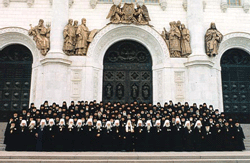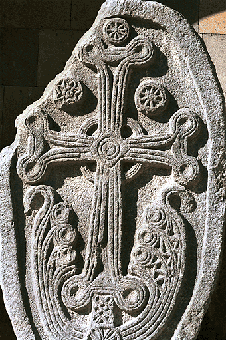
2000: The year in review
Ecumenical space: building trust for common action
Ecumenical space: building trust for common action

Geneviève Jacques, director of the WCC Cluster on Relations, says ecumenical space refers to opportunities that enable members of the ecumenical family to deal with divisive issues in a spirit of trust. "This is a time of increased fragmentation in society, and it impacts on the churches, influencing them to turn back to their life in separate denominations and parishes," she says. "The WCC is called to take a stronger role to challenge fragmentation and regain the meaning of oikoumene."
One example of an ecumenical space, the Joint Working Group between the Roman Catholic Church and the WCC, met for the first time since the WCC's 1998 assembly in Harare, Zimbabwe, in Antelias, Lebanon, in May. There, the Group began work on an agenda that included study of baptism, national and regional councils of churches and ecumenical dialogue, particularly their significance for the life of the church. As part of the great jubilee celebration, representatives of the WCC were also invited to participate in events in Rome.
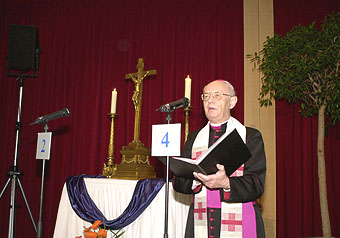
"It came as an unexpected bombshell during the jubilee year," says the general secretary of the WCC. But subsequent statements by some Vatican officials against the approach taken in parts of the document showed that the way the ecumenical teaching of the Second Vatican Council is to be interpreted has not been definitively established. "We now see that Dominus Iesus may have done us a service," Raiser says. "It made visible that what seemed to be a problem between the Roman Catholic Church and other churches is in fact an unresolved tension within the Catholic church and its hierarchy. Therefore, we can now discuss it. It has become a common ecumenical problem."
Meanwhile, the WCC has been developing the idea of a "forum" that would bring together representatives of Roman Catholics, Pentecostals and Evangelicals for occasional joint meetings with WCC member churches to advance Christian unity and, where possible, enable all participants to move together with a sense of Christian mission.
Some 20 Evangelical and Pentecostal leaders from various parts of the world accepted a WCC invitation to discuss the proposed Forum of Christian Churches and Ecumenical Organizations at a meeting 9-11 September at an Evangelical institution, Fuller Theological Seminary, in Pasadena, California, USA. They suggested that the term "ecumenical" be avoided in developing the proposal because of negative connotations the word carries in some Evangelical circles, and that the name be Global Christian Forum. A continuation committee met 13-14 December and decided that a larger meeting should be held 8-14 December 2001 to decide whether a forum should be convened and, if so, when and how it should be arranged.
A 1-4 June worship consultation in Prague, Czech Republic, brought together representatives from a wide range of churches, from Orthodox to Kimbanguist (an African-instituted church in the Democratic Republic of Congo), to discuss such sensitive issues as: How does the believer's faith relate to baptism as a sacrament of the church? If we do have a common baptism, why
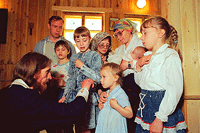
The difficult questions remain; following responses from churches, theologians and liturgists, a further round of discussion under Faith and Order auspices is scheduled for October 2001.
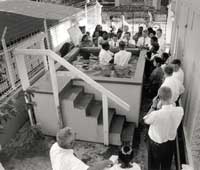
Falconer also underlined the good cooperation between two traditionally distinct streams of the historical ecumenical movement - Faith and
Participants - theologians, missiologists and missionaries from all traditions - worked with a 1982 WCC document entitled Ecumenical Affirmation on Mission and Evangelism, and a recent Faith and Order study document on The Nature and Purpose of the Church, but also through story-telling, encounter, reflection and common prayer.
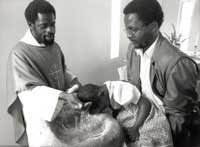
Topics ranging from faith healing in the charismatic movement to lessons learned from Indigenous spirituality, from healing rites in classical liturgies to insights from scientific research on the impact of religion on healing, were explored at a consultation on faith, health and healing organized by the WCC's Mission and Evangelism team in cooperation with the University of Hamburg's Mission Academy. The consultation brought around forty missiologists, mission practitioners and medical personnel to the academy in June. The relation between mission, health and healing has been identified by the Mission and Evangelism team as a field for new study over the next few years, and the consultation was seen as a promising start in that direction.
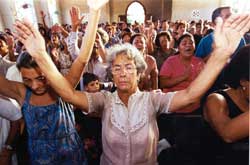
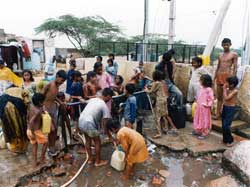
Within the WCC, efforts continued in 2000 to deal with objections raised by Orthodox churches in the Council's membership to some of its ways of working. A Special Commission to assess the issues involved met for the first time in 1999. Activity in 2000 included meetings of all its sub-committees and an October meeting of the full commission, hosted in Cairo by the Coptic Orthodox Church. The goal is to reach the point where the Orthodox are able to say they feel like full and equal partners in the Council, not just marginal members of a dominantly Protestant body, operating in a Western style.
Members of the Commission have come to a "shared vision" about the "common journey" they are on, says Georges Lemopoulos, an Orthodox layman who is deputy general secretary of the WCC. A move to decision-making by consensus rather than majority vote is on its way, he says. This seems to be a move that can change the ethos of the Council. The work of the Special Commission follows up on the WCC's earlier re-examination of its life under the theme of "Common Understanding and Vision", and will go beyond issues of specific interest to the Orthodox and address widely shared concerns that are both institutional and ecclesiological, he says.
The WCC's ability to assist in creating space was illustrated by a February meeting in Athens for theological educators in Orthodox theological institutions around the world. Together with theological educators in the wider church, the educators considered how they could support one another in the different contexts in which Orthodox theological education takes place. They also reflected on Orthodox contributions to and participation in ecumenical theological education. According to Oxley, "the meeting was thus an important first step in a new process".
Ecumenism has become controversial among the Orthodox of Eastern Europe, Lemopoulos says, partly because church leaders in the communist era were the ones who got involved in it, and who aroused suspicion because communist authorities allowed them to travel. The challenge now is to involve people, especially the younger generation.
Meanwhile, all Orthodox churches were celebrating the millennium year. Most of the heads of the Orthodox churches gathered in Jerusalem to celebrate Christmas in January according to the Julian calendar. They concluded the year with a pilgrimage to Nicea in December, Christmas according to the Western calendar. There, they recited the Nicene Creed in the ruins of the church where in 325 the ecumenical council declaring the true divinity of Christ was held. It was the first time in modern times that the structure has been used as a church. In both celebrations, Orthodox commitment to Christian unity was reaffirmed and what could be qualified as an Orthodox ecumenical agenda was elaborated.
As part of the process of deepening WCC ties with individual member churches, Raiser visited the Patriarch of the Syrian Orthodox Church and WCC president, H.H. Ignatius Zakka Iwas, in Damascus in May, and Armenian Catholicos, Garegin II, in Armenia in September. The Catholicos, in turn, visited the WCC in Geneva on 28 February 2001.
